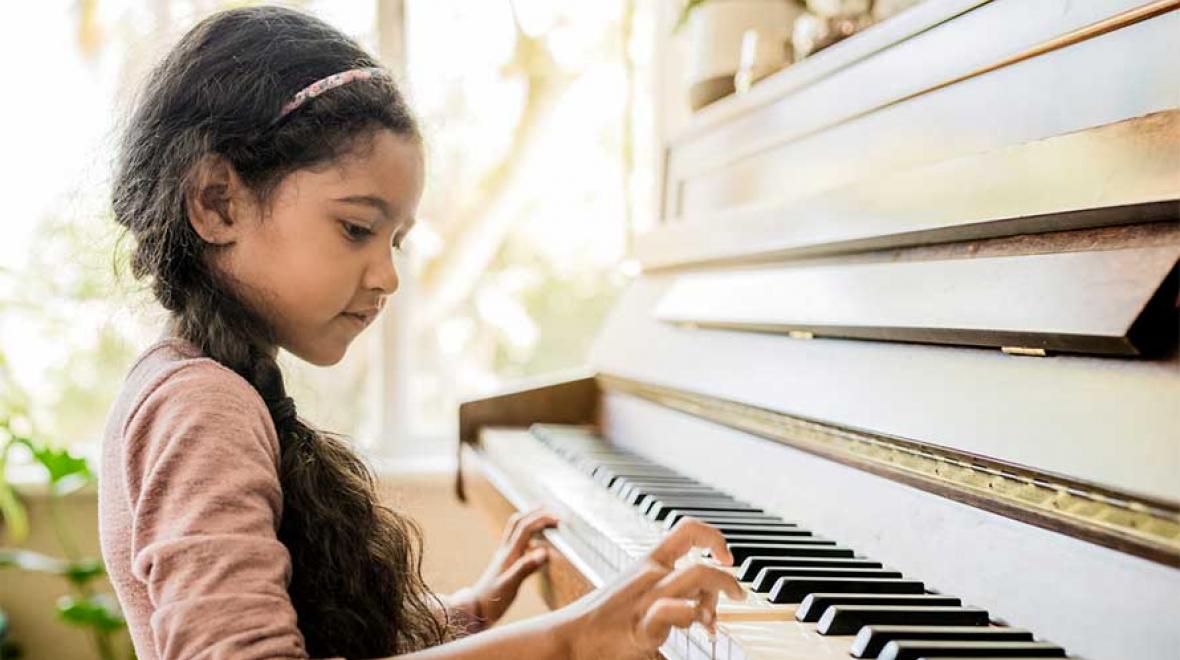
Unlike the Partridge family, we don’t drive a Mondrian-colored bus to gigs, but we are musical. My wife’s in a band, I’m in a band, and our two kids have been in various bands — marching, jazz, rock, symphonic, high school musical — throughout their school years. All told, we play piano, guitar, ukulele, drums, trumpet, French horn, mellophone, a little bass and a little less accordion.
The purpose here is not to toot our own horns (though two of us can do that) but to explain that music is our pastime, our comfort and our elixir. We do music because we want to and, more importantly, because we have to.
Why is music so essential? When I took piano lessons as a kid, my mom didn’t consult a study on brain development in children who play music. She played piano and organ, and when she saw me plinking along on the keys with her, she decided it was time to sign me up with the local piano teacher (perhaps to keep me from ruining her practice sessions).
That was then. We know much more about the effects of music on the brain these days, though some of what we know has taken a detour. When our oldest child was born in 2001, the so-called Mozart Effect was still in vogue. Based on a 1993 study that showed improvement in spatial reasoning when students listened to a Mozart sonata, this phenomenon spawned a whole catalog of CDs, books and videos meant to enlighten babies, including those in utero. Like many parents in search of the best resources for our kids, we bought the "Baby Einstein" videos that played selections of classical music while cute children interacted with brightly colored puppets, electric trains and kinetic gizmos in an amalgam of ear candy meets eye candy.
Trouble was, the Mozart Effect was mostly hype. By the time our kids had advanced from "Baby Einstein" to "The Little Einsteins," the Mozart Effect had been debunked by subsequent research that showed a misreading of the original study’s results. For the most part, the salutary effects were deemed temporary, with some researchers even arguing that music lessons are a complete waste of time.
Which isn’t to say music isn’t beneficial. “Music breathes, speeds up, and slows down just as the real world does, and our cerebellum finds pleasure in adjusting itself to stay synchronized,” writes neuroscientist Daniel J. Levitin in his book "This Is Your Brain on Music: The Science of a Human Obsession." And, as Emmy-winning documentarian Elena Mannes notes in her book "The Power of Music: Pioneering Discoveries in the New Science of Song," “Music probably uses more areas of the brain than any other function.”
But the real brain work seems to come with learning and playing a musical instrument as opposed to passive listening, pleasurable as that may be. Many studies have shown the advantages of such active engagement in music. For instance, a 2013 study published in the Journal of Neuroscience shows that musical training enhances neural responses to speech sound. What’s more, musicians tend to develop more gray matter in areas that benefit auditory processing, a Northwestern University researcher demonstrated. Another study, published in PLOS ONE, an online science journal, revealed a correlation between instrumental music training and “enhanced auditory discrimination, fine motor skills, vocabulary and nonverbal reasoning.” According to research from Concordia University, starting music lessons at a young age (before 7) increases the connectivity between the brain’s two motor regions. And a five-year study at the University of Southern California's Brain and Creativity Institute has shown that brain development in young children was accelerated by music instruction.
Music enhances memory, has been used as therapy for Parkinson’s disease, depression and other ailments, is a social adhesive from the campfire to the rock concert to Carnegie Hall – so it’s not just for young, developing brains. But, clearly, early training in music offers a variety of advantages.
Still, like my mom, I signed up my children for piano lessons because they expressed interest, not because I thought it would make their synapses fire more effectively.
And all you have to do is look at a Who’s Who of famous musicians to realize that playing music doesn’t guarantee superhuman powers, maturity or wisdom. (Take your pick of professional musicians who have made bad choices in life.)
But learning music — taking up an instrument and putting in the practice — might just give your kids that little extra cognitive boost at a time when they could benefit the most. Plus, in addition to enhancing brain function and small-motor skills with individual instruction, kids can also develop social and teamwork skills by learning to play in a band. I know mine have.
That’s just one reason why we’ve continued to encourage their musical interests. We might not play in the same band together, but we’ve found a common bond that helps keep us in tune as a family.











